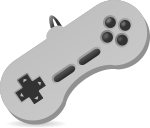Back • Return Home

The Video Game As A Tool For Learning & Healing
I remember starting to feel guilty about spending an entire day on a game, thinking to myself, "Why did I spend so much time on that?". I respect the art that went into making it and enjoyed the process of playing it, but it sometimes felt like I had nothing tangible at the end of it, especially for the amount of effort expended. It took me awhile to realize that "the cereal is the prize" and that it only becomes a "bad" thing when it leads to harm, such as neglecting ourself or our responsibilities. It is always nice to find something wholesome and relaxing in order to unwind.
But how do we find something that lasts beyond the game? When I was young, I could claim that the video games that I played were training in hand-eye coordination, cognitive agility, and maybe even served as physical exercise to some extent (e.g.: "StepMania"). But it seems that one quickly reaches a point of "diminishing returns" unless they are playing a game that can develop abilities that translate into "real life" more directly. For example:
• learning a language (e.g.: "Influent"), or getting good at typing the ones that we already know
• learning how to play a musical instrument (e.g.: "Synthesia" for piano or "Rocksmith" for guitar)
...and so on.
There are a lot of general learning apps out there too (e.g.: "Complete Music Reading Trainer", "Red Cross First Aid", "Offline Survival Manual", etc.). The majority of educational software is only available for computer or smartphone, as most dedicated educational video game consoles are usually intended for small children (e.g.: the LeapPad). In my opinion, the Nintendo Wii and the Nintendo DS got close to making educational software a more widespread phenomenon because they had features that made them readily accessible to a large demographic. Like many video game consoles, nothing needed to be installed, just pop in a disk or cartridge and turn it on. They were easy and intuitive to control (i.e.: using motion sensors or writing directly onto a touchscreen with a stylus). And most importantly, they had a lot of lifestyle-related titles to choose from. For example, some taught how to draw (e.g.: "Art Academy"), how to cook (e.g.: "Happy Cooking"), or acted like a fitness trainer (e.g.: "Wii Fit"), in addition to all of the ones that taught languages (e.g.: "My Spanish Coach") or had activities intended to enhance memory and logic (e.g.: "Brain Age").
Educational games can be oddly specific in their subjects, but the more detailed ones are usually related to computing in some way (e.g.: "while True: learn()" for understanding machine learning and "Operation Deep Magic" for understanding cryptanalysis techniques). Some do not explicitly teach information that is usable outside of the game world, but can help get one into the mindset necessary for doing things like basic engineering or computer programming (e.g.: most of the games made by Zachtronics). At that point, would it be better to just learn basic engineering or computer programming though? Personally, I think anything that makes learning more enjoyable is always welcome! ☺ At the very least, it can supplement our studies, acting as positive reinforcement when we play them during a break.
While they might be advertised as such, some of these are not "games" per se, but simulators that can actually function like a tool in their own right (e.g.: putting together computers with "PC Building Simulator", designing computer logic with "Ones & Zeros", testing electrical circuits with "ElectricVLab", etc.). A few of them are also intended for "professional" settings and probably outside of most people's budgets (e.g.: medical training environments for learning anatomy or becoming familiar with emergency situations, like "VR-CPR" and "Medical Holodeck"). They might be accompanied by physical equipment that is quite large as well (e.g.: the simulators for learning to drive or to fly).
For many, educational games can be "hit-or-miss" in both content and gameplay. There have been a few that I think have a good balance, where the game is both fun and teaches a skill without it feeling like a chore (e.g.: "DragonBox +12" for learning Algebra). There are games that can even help us to overcome learning difficulties like "dyscalculia", or act as physical therapy to rehabilitate from illness/injury. In general, it seems like educational games have so much untapped potential!
Some have approached this in a different way, "gamifying" education itself, or approaching aspects of life like a game to try to make constructive things easier to do (e.g.: treating goals as "achievements to unlock", or gaining practical knowledge and skills by thinking of them as something that we "level up" in like a character in an RPG or "Role-Playing Game"). One of the most inspiring examples that I have come across of this method is the story of Nick Smith or "Ulillillia".
We hope that this article has been and will continue to be helpful to you!
Thank you for reading! ♥
[Please note that the above links to games are not necessarily recommendations, only examples. I have no affiliation with any of those projects.]
